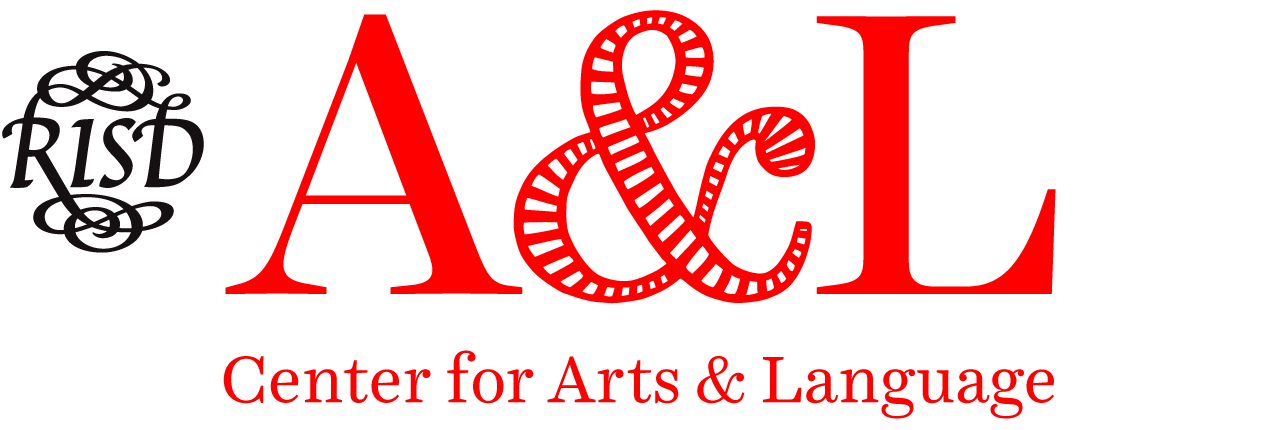Written, spoken, and visual communication at RISD
While everyone attending RISD expects to express themselves through studio work, we don’t always anticipate the many ways and contexts in which we’ll be asked to communicate in other modes. Below, you’ll find out what kinds of assignments and situations on campus call for written, spoken, and visual communication.
We work with students on all kinds of projects—academic, personal, and professional, required and self-motivated. You may find yourself with a task that falls outside these lists and descriptions. No matter what comes your way, we’re here to help.
-
Writing is a powerful tool for processing and retaining information and for clarifying and conveying thoughts for ourselves and to others. It can play a profound role in artists’ and designers’ practice: articulating choices, processes, and contexts establishes an artist’s fluency and agency. That’s why you’ll find that writing is a cornerstone of engagement in the RISD community.
Undergraduates take Liberal Arts courses that emphasize writing for various disciplines, many of which may be new to you in the first year. You might also take upper-level Liberal Arts courses with intensive writing requirements, courses in creative writing, and engage in studio writing activities. Some departments, such as Photography, require a senior written thesis.
All graduate students write a thesis in their final year. While the criteria vary from department to department, most theses describe and illustrate your work and place it in historical, theoretical, and practical contexts. Graduate Commons courses may also emphasize reading and writing.
All RISD students will do plenty of professional writing, applying for grants, residencies, internships, jobs, and perhaps admission to graduate school or doctoral programs. Writing is also an art form itself, and many RISD students write poetry, fiction, or plays, or engage language as a material in their work.
Gaining skills in these different genres improves our ability to write for any context—a key to participation in local and global communities. Tutors are here to help you approach new discourses and negotiate between the types of language and rhetoric you already use and those you are trying to obtain.
RISD students at all levels will do plenty of professional writing, applying for grants (like the Grad Student Project Grants), residencies, internships, jobs, and perhaps admission to graduate school or doctoral programs. Writing is also an art form itself, and many RISD students write poetry, fiction, or plays, or engage language as a material in their work.
Gaining skills in these different forms of writing improves our ability to write for any context — something that’s key to participation in local and global communities. Tutors are here to help you approach new discourses and negotiate between the types of language and rhetoric we already use and those we are trying to obtain.
-
Talking with people is something we all do every day. Public speaking is differentiated by specific contexts and expectations — conditions that can make us feel stressed, exposed, and nervous. People often label themselves as “bad at” public speaking, as if this status is fixed for life. To the contrary: although public speaking skills are rarely practiced, they are highly learnable.
Students at RISD encounter many opportunities to speak in public (and most mirror the public speaking you’re likely to do in your future as an artist or designer as well). Informal speaking situations, like meetings with professors and in-class discussions, happen all the time. You’ll also find yourself speaking formally, whether persuasively (giving thesis presentations, for example), informatively (in class presentations or introducing a guest speaker), or in performances or readings of your work. Situations for discursive modes of speaking include critiques, panel discussions, and Portfolio Review.
We provide opportunities to prepare for specific occasions of public speaking — from artist talks and elevator pitches to job interviews to Kickstarter videos — and to build skills you can apply to future occasions. A session could be spent on rhetorical effectiveness, perhaps focusing content or forming a narrative. You could learn more about the psychology of public speaking to calm your nerves or practice projecting your voice and using purposeful gestures. You might want a “studio sounding board” to articulate ideas around your work before a critique. With attention, awareness, and commitment, anyone can gain confidence and ability in public speaking.
-
People often expect an artist or designer to be adept at all kinds of visual composition — even though a Furniture or Textiles major may never get to take a Graphic Design course. You will want to have a clean and professional resume, a beautiful and user-friendly website, and attractive posters for shows and events. These demands are in fact universal; our screen-and-image-driven world requires us all to create and interpret both content and form.
You’ll have plenty of practice creating visual projects at RISD — and not just related to your work. You’ll create slides for class presentations and artist talks; you’ll make flyers and postcards for exhibitions; you’ll design business cards for portfolio review and design your own thesis book. Working with a tutor will allow you to do so with greater awareness, skill, and effectiveness.
Providing a kind of “free design consultancy” for both beginners and those with foundational knowledge, visual communication tutors share basic design principles, like establishing aesthetic, choosing and setting type, designing on a grid, creating image strategies, and selecting and applying color. They can also give critical feedback on particular projects and help with how-tos in various design programs.



